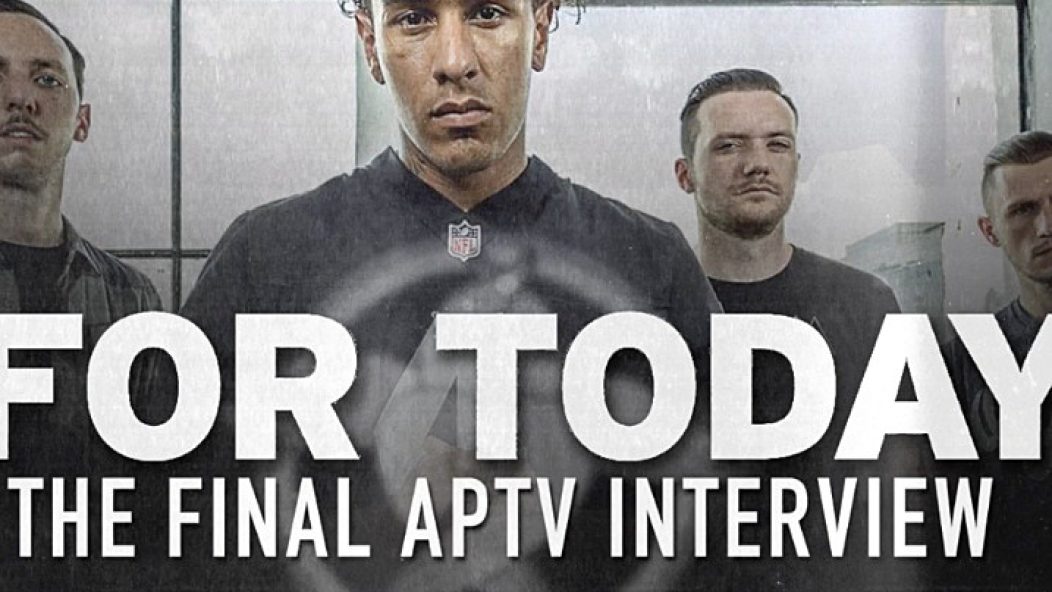
For Today members hope their band leaves a legacy of faith, inspiration after farewell tour
Before embarking on their final tour, Mattie Montgomery and Ryan Leitru of For Today sat down with AP to reflect on the final chapter of the band and what they've learned over the years. The Christian metalcore group discuss the challenges they've faced, the virtue of integrity and thank their fans for all the support. Read the full interview below.
How does it feel knowing your farewell shows are the last you’re going to play?
Mattie: I think a lot of times when you’re in the middle of something, you don’t appreciate it for what it is. I think especially, it seems in the music industry like you always need that next big tour, or that next big interview, or that next big record deal. So there’s always something out in the future that you’re not there yet. I think it’s easy for people in this industry to feel like maybe as much as they’ve achieved, they’re still not really satisfied, they still need just a little bit more. And now more than ever—we’ve been doing this for 10 years—all of that stuff is irrelevant. There’s no more big tours, there’s no more big breaks, we’re not gonna negotiate anymore album deals, or write another album or worry about first week sales again. Now we really get to be in the moment everyday. We really get to strip it all down to what it’s always been, which is us playing the music that is in our hearts for the fans that it has resonated with. So it’s a really beautiful thing in that sense: to be able to be in the moment at these concerts and to not have to worry about what’s next, what’s around the corner, where we’re gonna go after this. It’s just stripped down in this really authentic moment between us and the fans.
What do you hope people have taken away from your band and how do you hope you’ll be remembered?
Mattie: If there’s one thing I hope people think of when they think of our band forever, it’s Jesus. I have seen and toured with a lot of different bands with a lot of different agendas, messages and personas. The reality of this thing is, for 10 years we’ve taken this as an opportunity to share the hope that we’ve found. And I think there’s a lot of different people with different opinions and perspectives on this, but I don’t want to talk about my opinion. This is what I know: I wouldn’t be alive if it wasn’t for Jesus. I wouldn’t be who I am if it weren’t for him. I don’t just believe that he’s alive and he’s powerful, I know it. I’m living proof of it. So through our music, through our concerts, through our lives, that’s been the message we want to share with the world. And I know sometimes that can be polarizing, challenging to people or whatever, and I don’t mean to offend anybody, but I have to be who I am. I can’t be ashamed of this hope that I’ve found, cause I know it has the power to save a lot of people that need help. That’s the legacy that I’ve wanted to leave all along; that’s been the whole point of all of this. I hope that through our example, people can find the courage to stand up for the truth that they’ve found and to share hope with the world that is so desperately in need of it.
Ryan: I feel very content in looking at our body of work and the places we’ve gone; all the goals we ever made were met and exceeded. Everything has been just a bonus, so it’s exciting to be able to look back on it and think, “We did everything we wanted to.” And we did it without compromising who we are. That’s a legacy that is what I have always hoped to leave. Be authentic and show that it’s okay to be who you are even if not everyone loves it, even if you’re polarizing, even if people misunderstand you and hate you for who you are and who you’re not. That you can be yourself and be content in that, which maybe gives some people a boost to do the same.
How do you think being in this band has shaped you as a person? What have you learned?
Mattie: That could be a long answer. I just wrote a book about it, actually. A whole book that is trying to answer that question, what have I learned over the last 10 years. Really, I think it boils down to this: I think that it’s really easy for people in any scene, but especially in our scene or our culture, to feel overwhelmed by the darkness that always surrounds us, disparity and the difficulty that we see with racial tension in our nation, and the political climate, and the economic climate, and the educational system that seems to always be falling apart and hanging on by a thread. There’s a lot of kind of scary things that are happening in the world around us. But if there’s one thing that I’ve seen hanging out in bars and clubs and back alleys with weird looking kids for the last 10 years, it’s that even in the ugliest places, if we’re willing to step into the mess, we can see hope begin to flourish there. And this thing—this intimidation thing—that tries to convince us that it’s too far gone, it’s too broken to be fixed or it’s too lost to be found, this thing threatens our generation and our scene with this idea that you shouldn’t even try. You shouldn’t try to help, you shouldn’t try to offer solutions, you shouldn’t try to build a better future because it’s beyond hope at this point. But I’ve seen over and over again in my life and the lives of other people that if you can be brave enough to step into the mess and get your hands dirty and say I know it’s intimidating but that’s not gonna stop me, step into somebody's life as dirty or inconvenient or maybe even hurtful as that might be, if you’re willing to step into the mess, you can help be part of the solution. I think that’s really what we all want, but so many of us take 10 steps back and resign to just smoke weed and play in bands, and just waste our time sort of, trying to make a little bit of money where we can, and that’s it. But I think we have it in our heart to do a lot more than that, that’s a good thing. I’ve learned and I’ve seen time and time again that where people are willing to get dirty and be courageous enough to get involved in the brokenness they see in the world, that they really can help become a part of the solution.
Ryan: In doing this, I think we’ve seen so many bands come and go with different messages, and a lot of bands that have kind of been Christian bands—it does have a tendencies in this industry to go one way or the other. A lot of times it crushes people. When you do decide to take a stand for something, you may be inadvertently putting yourself on a pedestal, and there’s a weight that comes to that because people expect you to be perfect. And the moment that your imperfection is in front of people, they look for that as a moment to tear you down. You do see a lot of these bands that we tour with, it has been the opposite for them. It has been a thing that had destroyed their faith. To tie it in with what Matty was just saying, having the right mindset, something can either be a great thing or a terrible thing depending on how you process it. The worst thing that has ever happened to you could end up being the best thing. In a weird way, you can see something really bad and you can look at it and go, “Man, that’s bad, I feel bad about that,” or you can look at it and say, “Wow, why is this bad? Maybe there’s something good that can come from it.” It can really be a thing that makes your faith grow and strengthen. Or you can choose to look at situations negatively and it can be the very demise of your faith. So we’ve seen both sides of it, and I’m very thankful that we’ve all been able to have a strong enough group of guys to continue to point us in the direction that [Mattie] was mentioning and continue to have are faith be strengthened rather than be destroyed, because we’ve definitely seen that, and this is a world that will do that. If you choose to process things in a negative way, it will certainly destroy a lot of things.
What advice would you give to someone who maybe wants to follow in your tracks?
Ryan: First off, if something is important, make it important. I think that’s the biggest thing that people can go wrong with. In a lot of areas in life but specifically in faith, a lot of people know this thing is important and they prioritize the important things for lesser things. It seems very simple, almost like a stupid thing to say, but I think if you analyze your life in any way, everyone doesn’t do the things they know they need to in order to do other things, and then they wonder why things go wrong. I think for a lot of people if something is supposed to be number one priority, make sure it’s number one priority and don’t use lesser things as an excuse for pretty much everything and then wonder why things fall apart. I think that’s the big thing: Keep the important things important and make sure that you have people to keep you accountable for doing that because it’s super easy to let things take a backseat if your own will power or work ethic is the compass, because sometimes those things fail us. It helps to have people around you that have your best interests in mind that you can all agree, let’s not do anything stupid or try really hard to not. And then they can help you fix it if you do. That’s where I would start.
Mattie: I would also say, don’t ever compromise. Ever. For any reason. It would be better to play basements for local bars for the entirety of your career and be able to end it with your head held high and your dignity and integrity intact than it would be to play in stadiums and arenas all around the world and feel like you sort of toned down your identity or you put a cap on who you really are to become more palatable or appealing to a larger crowd. We’ve had a lot of people say, “Well, it’s cool that you have your faith, but maybe tone it down a little bit.” I always thought, these bands I grew up listening to, no one told Raise Against The Machine to tone it down, because they had something they believed in and they were willing to fight for it even if it was polarizing, even if people disagreed with it. But there’s something about this Jesus thing that people can’t handle—it’s too intense, it’s too extreme. Zack from Rage Against The Machine can stand on stage and say that he thinks George Bush should be executed as a war criminal and people are like, “Yeah, friggin’ sweet! I gotta buy six shirts tonight!” But when I say I believe Jesus can save you, then suddenly it’s like too much for some reason. Never compromise. Never give up. Be who you are. Fight for your integrity first and whether your band gets huge or not, just hang onto your integrity because that’s a lot more valuable than album sales or your fanbase.
What are you guys most proud of as a band?
Mattie: We may have different answers. I think the thing I’m most proud of is that I feel like we’ve done that. We’ve seen countless people come and say that they are Christians and we do this for God, then after a couple years in the scene and maybe a little bit of success, maybe a couple managers or record executives say, “Maybe you should tone it down” they start to hear that message. So they tone it down and they tone it down a little bit more, and then a couple years later they’re no different from anybody else. I think the thing that I’m most excited about is 10 years ago at my first concert with the band in a tiny venue in the upstairs of a venue called The Vault in Buffalo, Minnesota, I preached the gospel—I shared Jesus with everybody that was there. And now 10 years later at our last concert in front of 1,000 or 2,000 people in Dallas, I shared Jesus with even more passion than I did 10 years ago, because we kept our focus on what was most important. We kept our focus on what we valued highest, so because of that I can say that I really am, in terms of priorities, the same person that I was 10 years ago. We can say that about all of us. That, I think, more than ticket sales or concert attendance, traveling the world or anything like that, all those things are incredible. But the thing I’m most excited about is that for anyone who’s ever looked up to us or been inspired by us or anything like that, the legacy hopefully that we’ll be able to leave behind for them is one to not just say to them but to show them that you don’t have to compromise to succeed. You don’t have to compromise to fit into some mold that somebody else made. You have to break the mold. Be you. Be who God made you to be. I’m excited to see that we have done that and still been able to see the dreams that we had as 15-year-old kids come true.
Ryan: We made some music, also, that was alright.
Mattie: Yeah, we made some sick records.
Ryan: We made some music. I think that’s the thing that really transcends music. Trends change—you guys know this, you’re AP. Band’s are cool and then they’re not cool and new bands are cool. Long after people aren’t moshing to the same kinds of breakdowns or whatever, hopefully there will be people who can remember something that transcended music for us, and I think that’s something to be really proud of. For some people that cared about what we did, it mattered. That’s something really exciting that music can connect people and matter to people more than just, “I went to a show, and it was sick and my friends are there.” Like, it can mean more than that. And those are the kinds of bands that I got into when I was getting into music. It was bands that had something to say and when you left the show you were different than when you arrived there. And I think it’s great that our music can transcend the life of our band as well as, hopefully, us as people.
Is there something that you want to leave your fans with? Something you just absolutely need them to know before you go?
Mattie: Yeah, I just love you so much—we love you guys. You are loved, you are valuable. One of the fundamental things that we believe as Christians is that Jesus died for you, and that makes you pretty important. So no matter what your situation, or your life, or your friends or family members have said contrary to this, the truth is that you are valuable and that you are loved, and that you are incredible and beautiful just the way you are. I hope that if there’s one thing that could have come through all of this that you would know that you—right where you are and right who you are—you are important, and you are valuable, and you are, above all, loved.
Ryan: I think, just, thank you. In two words I think that’s it. We have been able to see the world and support our families and be a part of something so much bigger than ourselves, and without people who care, none of that’s possible. Though it is sad to see it go, that’ll always be a big part of who we are. Everyone I know—all of our wives, even my brother-in-law and people you would see more on the sides—I wouldn’t know anybody that I know, and my life would be totally different if it weren’t for the people that cared about the band and kept it going. So, thank you doesn’t really sum it up as well—the English language doesn’t really have something that can show gratitude well enough—but thank you for caring. alt
Subscribe to APTV for more interviews with your favorite bands.







